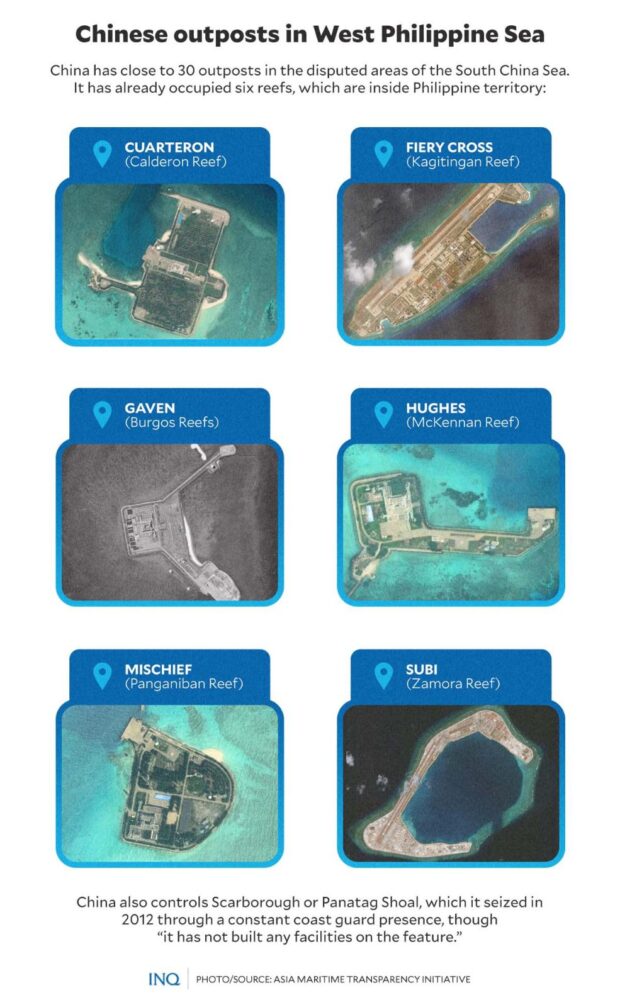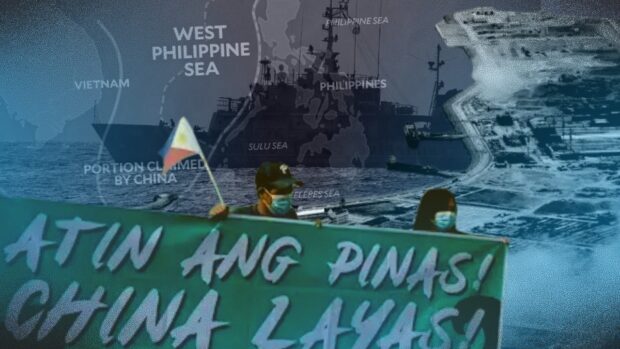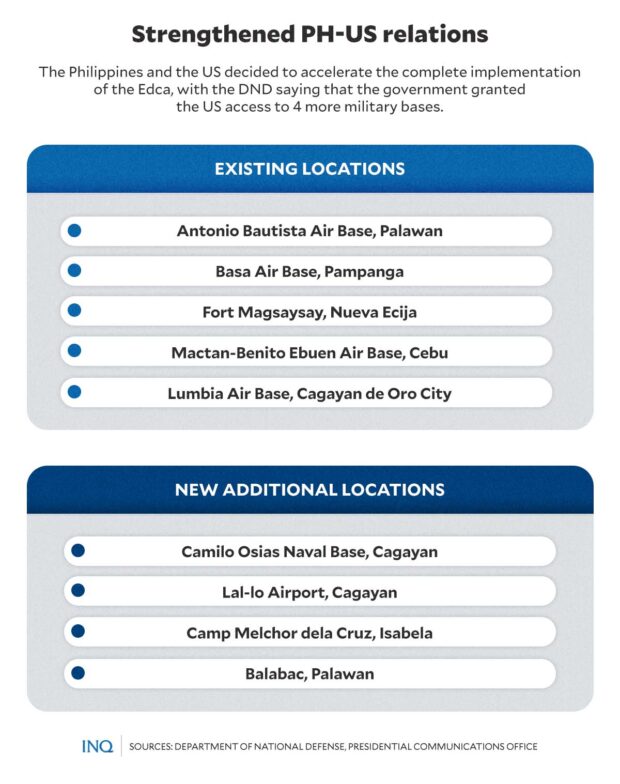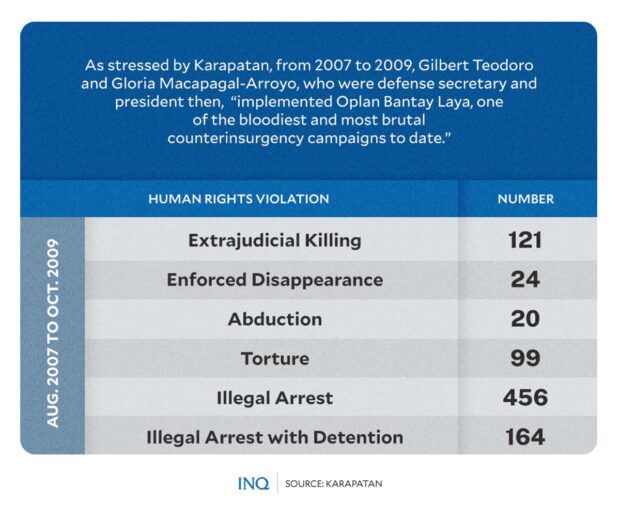Gibo Teodoro in DND: Stronger sovereignty fight, tough counterinsurgency hand seen
MANILA, Philippines—The appointment of Gilbert Teodoro as defense secretary drew mixed reactions, with some saying he is experienced and reliable, while others pointing to his stand on human rights as worrisome.
Teodoro, over a year since a failed senatorial campaign in 2022, was appointed by President Ferdinand Marcos Jr. on Monday (June 5) to lead the Department of National Defense (DND) which, since last year, had been headed only by officers-in-charge (OIC).
Jose Faustino Jr. served the DND until his resignation on Jan. 9 and was succeeded by Carlito Galvez, who was OIC until the appointment of Teodoro. Both had served as chief of the Armed Forces of the Philippines (AFP).
The AFP, which immediately expressed support for Teodoro, said “we believe that his decisive leadership, professional competence and wealth of experience […] will help build upon our gains in the defense and security of our country.”
READ: Defense chief Teodoro: A legal mind for nat’l defense and military matters
Article continues after this advertisementTeodoro, a lawyer by profession and former representative of Tarlac, was Gloria Macapagal-Arroyo’s secretary of defense from 2007 to 2009. He ran for president in 2010 but lost to Benigno Aquino III, a relative of Teodoro’s.
Article continues after this advertisementThis, security and defense analysts said, is the reason he is regarded as “experienced,” especially with his “knowledge on navigating bureaucracy, political leadership, and military moods.”
Fit as DND chief
Joshua Bernard Espeña, a resident fellow of the think tank International Development and Security Cooperation (IDSC), told INQUIRER.net via FB Messenger that Teodoro’s experience is an advantage.
“His previous experience can provide insights into how well the AFP has transformed in terms of doctrine, force structure, and capabilities since the Arroyo administration,” he said.
Espeña, a lecturer at the Polytechnic University of the Philippines, stressed that at that time, “the Philippines was confronting internal security against Islamic separatists and Communist insurgents, which is heavily army-centric.”
Based on Teodoro’s website, as DND chief from 2007 to 2009, he emphasized his “desire to institutionalize reforms in the Defense Department that would enhance defense service, systems, procedures and capabilities.”
Teodoro, who finished 12th in the senatorial election last year with 12,789,479 votes, also pointed out the need to have a “stronger, rational and strategy-based national defense policy.”
Looking back to the Duterte presidency from 2016 to 2022, Teodoro was offered twice by Duterte to be his DND chief, but he begged off for family reasons. He later made himself occupied as corporate executive.
In 2021, he expressed interest to run as vice president of Sara Duterte, who was still the mayor of Davao then. He ended up as part of Marcos and Sara’s Uniteam senatorial ticket in 2022, though.
As Dr. Chester Cabalza, president and founder of IDSC, told INQUIRER.net via FB Messenger, Teodoro “will run the DND now stronger and more credible from when he first sat as the secretary.”
New conditions
Related to this, Cabalza said “first, the swing to Washington’s favor in our defense and security policy through the expansion of the Enhanced Defense Cooperation Agreement (Edca) sites and the new provisions for the defense bilateral agreement.”
READ: Deeper defense ties with US: What it means for PH
Back in April, Malacañang identified the locations of additional Edca sites: Camilo Osias Naval Base in Sta. Ana, Cagayan; Lal-lo Airport in Lal-lo, Cagayan; Camp Melchor dela Cruz in Gamu, Isabela; and Balabac, Palawan.

GRAPHIC Ed Lustan
Then last May, US Secretary of Defense Lloyd Austin and Galvez established the Bilateral Defense Guidelines to “modernize alliance cooperation in service of the United States and the Philippines.”
Looking back to the 2000s, Arroyo was regarded by the think tank International Crisis Group as “more receptive” to China, as stated in a report by Rappler. It was also Arroyo who said Philippines and China relations went to an all-time low from 2010 to 2016.
READ: A Philippine view of 40 years of ‘breathtaking’ changes in China
Cabalza, a professor at the University of the Philippines Diliman, said it was in Teodoro’s time as Arroyo’s DND chief that the Philippines was engaging with China to foster bilateral ties.
With Aquino as president from 2010 to 2016, however, China’s aggression in the West Philippine Sea was met by so far the strongest protest from the Philippines—an arbitration case over the Scarborough Shoal standoff in 2012.
READ: Aggression in West PH Sea: China’s maritime ‘Great Wall’ plan
But China, instead, “flexed more of its military muscle” even if the Philippines, in 2016, won the case it filed at the Permanent Court of Arbitration (PCA), which ruled that the Philippines has exclusive sovereign rights over the West Philippine Sea.
China’s nine-dash line assertion was at best fictitious and has no legal basis, the PCA said, but China’s aggression persisted and even shifted focus toward asserting control over peacetime activity across the South China Sea.
As Espeña said, “as a proper statesman, we can expect him to support President Marcos Jr.’s command guidance towards calibrating for external defense,” referring to Teodoro.
Marcos previously said the Philippines is looking at the US as its “sole treaty partner” in strengthening and redefining ties amid tensions in the South China Sea and the Asia Pacific.
READ: ‘We’re not backing down’: PH message to China is now louder
However, he said, too, that the Philippines has not shifted away from China.
Firm stand
The DND stressed that the Edca expansion is “seen to boost disaster response,” but the new locations are strategic and would allow American soldiers enough proximity to Taiwan and the West Philippine Sea.
Through the years, the US carved its visibility in the region, especially with its official’s visit to Taiwan last year and the Philippines’ decision to grant the world power access to more military bases, something that have made China feel “threatened and contained.”
As Cabalza, who was formerly the vice president of the Center of Research and Strategic Studies, said, “as a top notch lawyer, he (Teodoro) must articulate well the legal viability of the sites against the pressure of China.”
He said Teodoro has “articulated in writings the advancement of the Hague ruling, which is also written in the new National Security Policy 2023-2028 that must be widely recognized during his helm as a second timer defense secretary.”
Espeña, meanwhile, explained that Teodoro “understands the political purpose of urgently modernizing armed forces, which is to secure what international law has awarded in accordance to national interests.”
Based on data from the Asia Maritime Transparency Initiative (AMTI), China has close to 30 outposts in the disputed areas of the South China Sea, occupying six reefs, which are in Philippine territory:
- Cuarteron or Calderon Reef
- Fiery Cross or Kagitingan Reef
- Gaven or Burgos Reefs
- Hughes or McKennan Reef
- Mischief or Panganiban Reef
- Subi or Zamora Reef
AMTI said China also controls Scarborough or Panatag Shoal, which it seized in 2012 through a constant coast guard presence, though “it has not built any facilities on the feature.”
The Philippines, meanwhile, is occupying nine features in the Spratly Islands: Commodore or Rizal Reef, Flat or Patag Island, Loaita or Melchora Aquino Cay, Loaita or Kota Island, Nanshan or Lawak Island, Northeast Cay or Parola Island, Second Thomas or Ayungin Shoal, Thitu or Pag-asa Island, and West York or Likas Island.
Teodoro, in a television interview, said the Philippines has the right to build up its defense capability without any question coming from other nations, stressing that “the Philippines is for the Philippines.”
RELATED STORY: ‘Our territory is our territory’: Teodoro pivots DND’s focus to external defense
“The way that we build up our credible deterrence is our business and nobody else’s business and whether we partner with country X or Y in order to build up our own core strength is a question for the Philippines,” he said.
He said he will not fall into the trap of siding with “one camp or the other.”
Tainted with blood
But his experience as DND chief has a downside, too, with the leftist human rights group Karapatan saying that with his appointment, “we recall some of the victims of human rights violations during his previous stint.”
It said in a statement that Teodoro and Arroyo “implemented Oplan Bantay Laya, one of the bloodiest and most brutal counterinsurgency campaigns to date.”
Karapatan pointed out that it documented 181 extrajudicial killings, 24 enforced disappearances, 20 cases of abduction, 99 cases of torture, 456 illegal arrests and 164 illegal arrests with detention from August 2007 to October 2009.
There were 117,133 documented victims of indiscriminate firing, 148,044 victims of forced evacuation and displacement and 9,154 victims of hamletting, too, the group said.
The use of schools, medical, religious and other public places for military purposes which, it stressed is in violation of International Humanitarian Law, victimized as many as 19,358 persons.
Karapatan specifically pointed out that in an interview when he ran for senator, Teodoro “seems oblivious to the 1987 Constitution’s Bill of Rights, especially provisions on presumption of innocence, when he parroted the National Task Force to End Local Communist Armed Conflict’s lines regarding counterinsurgency and red-tagging.”
Likewise, he recently said he will not revive the decades-long accord between the DND and the University of the Philippines, which prohibited police and military presence in the university except for special circumstances.
As the group said, with such an “appalling” record, the Filipino people have every reason to fear Teodoro’s appointment.
But in Teodoro’s website, it was stated that as the defense chief in the last years of the Arroyo presidency, he has “always been a consistent advocate of the need to uphold the dignity and worth of each and every human being, regardless of status in life.”
It said, too, that under his leadership, the DND intensified its campaign to ensure that AFP and DND personnel are continually updated and oriented on human rights matters.
With Teodoro as defense secretary now, “we are expecting that DND will succeed now in ending the local communist insurgency as it is perceived now that the government may enjoy the strategic victory in ending local insurgency,” said the DND.
“This seismic movement will determine if the AFP under his leadership as head of DND is now naval-ready and capable of external defense. Under his tenure as defense secretary, we are expecting the realization of the third horizon of the revitalized military modernization to achieve credible deterrence.”
But Espeña said “we have to watch out whether the Marcos Jr. admin would really end the communist conflict once and for all with Secretary Teodoro leading the defense department.”
Teodoro recently said he is not keen on resuming peace talks with the National Democratic Front of the Philippines, the political arm of the Communist Party of the Philippines.
READ: Defense chief Teodoro not keen on peace talks with NDFP, CPP
TSB
For comprehensive coverage, in-depth analysis, visit our special page for West Philippine Sea updates. Stay informed with articles, videos, and expert opinions.


